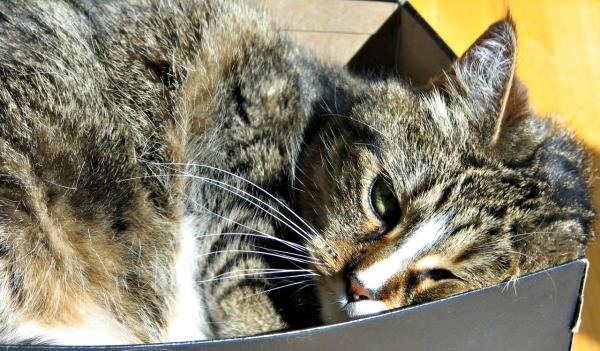Top Reasons Your Kitty Won't Use the Cat Box
Cats love boxes right?
But sometimes, for reasons that are often a mystery or foreign to the humans in the house, cats suddenly begin to avoid the litter box.
Among the top reasons your kitty won't use the cat box are... medical problems, the box or litter is not to your cat's liking, and stress.
I've outlined these common reasons in more detail below so they'd be all in one place in a fairly easy to read format. I've commented on some of them where I thought it appropriate.
Litter box problems are such a huge issue that I've devoted an entire section of the site to them, along with a way for you to be helped with your specific problems (or give help if you can).
Don't expect professional help here, though, as we're just cat lovers helping other cat lovers.
Cat box problems are, in fact, a life and death issue for cats. If that sounds a bit dramatic, realize that adult cats are less often adopted from animal shelters. The ones that aren't adopted within a certain time frame are often put to death.
By some accounts, the number one behavioral reason that adult cats are brought to shelters is due to inappropriate elimination and litter box problems that are deemed "unmanageable." It's such a shame.
Hopefully, this section of the site can help with some of that. If nothing else, we can at least promote awareness of this issue.
Top Reasons Your Cat Won't Use the Box
- Stress. As mentioned above, stress can be a big factor and common cause of litter box avoidance. Stress can come from many angles, such as another cat box guarding, a change in the furniture arrangement, a change in litter, and so on.
- Box placement, size, and type. Easy entry and exit, proximity to food, covered or uncovered, large or small, it all matters to the feline of the house. The box should be in a quiet location, have easy entry and exit, be of the right size, and away from food and water bowls.
- Move to a new home. All felines are extremely territorial. Try to make any move to a new location as easy on your cat as possible.
- Dirty litter box. The litter box has to be cleaned to your cat's specifications, and they have a sensitive nose. Cats also do not like strong smells such as citrus or bleach so make sure you rinse the box really well when you clean it.
- Too few litter boxes for the number of cats in the house. One box for each cat plus one more box is the recommendation from experts. Also make sure there is a box on every level of your home.
- A dislike of the texture of the litter
- New brand of litter introduced. When introducing a new brand of litter, do it slowly. If a problem develops, switch back to the old litter.
- Threats from an outside cat. This can be as subtle as a stray cat hanging around in the yard, and can disturb even an indoor cat.
- Disagreement with housemate. If your cat is constantly ambushed by another cat or dog in the house when using the cat box, a problem could develop. Also, general tensions and aggressions between housemates can sometimes play out as litter box issues.
- Household renovations. The noise and disruption of work being done on the house can induce a high level of stress in your cat.
- New cat, dog, or person added to the household.
- Change in owner's schedule. Your cat may be sensitive to changes in your routine.
- Medical problems and conditions such as a urinary tract infection, impacted anal glands, feline constipation, or cat parasites, including worms that infest cats.
Note: I can't stress enough how hard it is to guess at whether or not a medical condition (even a hair ball!) is causing a cat not to use the cat box. Below are just a couple examples from readers, and an important article from Winn Feline Health and the CFA. - Physical discomfort when entering or exiting the litter box. If your cat has arthritis or hip issues, injury or some sort of strain, or other condition causing pain or weakness. Senior cats are especially susceptible to mobility problems.
Medical Problems and Cat Box Avoidance
Medical problems are always the first thing to look for, and here are just a few examples as to why:
One of our readers noticed that her kitten had a sudden behavior change in two ways. He stopped using the litter box, and became withdrawn. His problem, apparently was a huge hair ball. Once he hacked it up, his behavior went back to normal, and he started using the box again.
Another reader's cat was leaving marks on the carpet. This is often due to dragging the rear end. The problem? Impacted anal glands, which the vet has to treat.
This article from the CFA stresses how urinary problems can impact litter box usage. I've added the emphasis in the quote below.
Feline Bladder Stones and Urinary Obstructions
"A urolith is stone-like object that can be found in the bladder and, less commonly, in the kidney, of cats. Some studies have shown that up to 13% of cats with lower urinary tract disease today have uroliths. They can be present without causing any symptoms in the cat, but they are very often associated with hematuria (blood in the urine), pollakuria (increased frequency of urination) and dysuria (difficulty passing urine). Many cats will attempt to urinate outside of their litterbox. In some cases, uroliths can cause partial or total obsctruction of the urethra (the tube leading from the bladder outside the body), so that little or no urine can pass. Obstructions are often emergency situations for the cat, causing great pain and endangering its life. Owners may see their cat visiting the litterbox frequently and straining and erroneously believe the cat is constipated."
Things to Keep in Mind
Cats can develop a preference for texture and location at any time. Punishment often makes the problem worse, and patience is essential to solving the problem.
If your cat suddenly decides to use your living room floor for a cat box, don't punish. It's worth repeating that stress of some sort due to a change in environment, routine, and so on is a major cause of cat box problems.
Remember that if a medical problem is the root cause, you cannot solve the problem until it is addressed. Also keep in mind that once the medical problem is solved, there will be behavioral issues and litter box retraining to deal with.
Your job is to reduce the stress and/or reverse the preferences that have developed.
Litter Box Problems
Cat Lovers Only




Comments: What do you think?
Have your say about what you just read. Leave me a comment in the box below.